Carolien Spaans: "Improvement of living standards in rural areas is a key to efficient agriculture and further development of Ukrainian economy".
In August after 3 years as an Agricultural Counsellor in Ukraine Ms. Carolien Spaans moved to Poland for her new posting. In this interview, prepared in cooperation with She Exports and project WoMo, Carolien tells about her life, journeys and work in Ukraine. She also shares her views on the business potential of Ukrainian sities and on the important role of agriculture for further development of Ukraine.
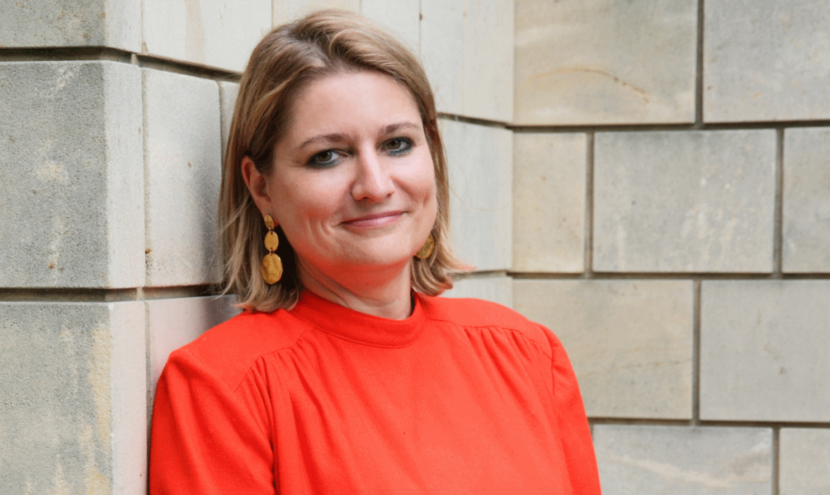
What do the Dutch know about Ukraine?
When I informed my friends in early 2016 that I was going to Ukraine as Agricultural Counsellor at the Embassy, many of them knew only that it was country in war. For Europeans, Kyiv is a city which is somewhere far away. At school, we were taught nothing about Ukraine at all; information about Eastern Europe was limited to the Cold War and the USSR. So it's no wonder that right after I moved to Kyiv, and that was in August 2016, one of my friends was delegated here to check if I was safe. She saw a beautiful, creative city, kind people and she liked the country. She returned to the Netherlands and told about her Ukrainian journey to our mutual friends. Since then, an endless flow of my Dutch friends and relatives have been coming to my place for the weekends, holidays and vacations. We do sightseeing, shopping, we enjoy delicious food and travel together around the country. I usually advise my guests to come in the spring or summer when the city is extremely green and attractive to tourists. Although there are those who have already mastered the winter "penguin walk" through slippery pavement of Kyiv streets. My friends like Park Landscape Alley, views on Dnipro from the hills of the old city and from the beaches of the left bank, the design of metro stations, the new Klitchko bridge, as well as city tours guided by students studying Dutch. Such walks give my guests a chance to hear more firsthand stories about the recent history of Ukraine. We have fun at quest rooms and travel to national parks like Beremytske which is not far from Kyiv (https://beremytske.com.ua/). I’m sure that more tourists will find their way to Kyiv and Ukraine, especially now, when low cost airlines are opening more routes and destinations in Ukraine and following the good reviews of Kyiv with the Eurovision Song festival (2017) and Champions League final (2018).
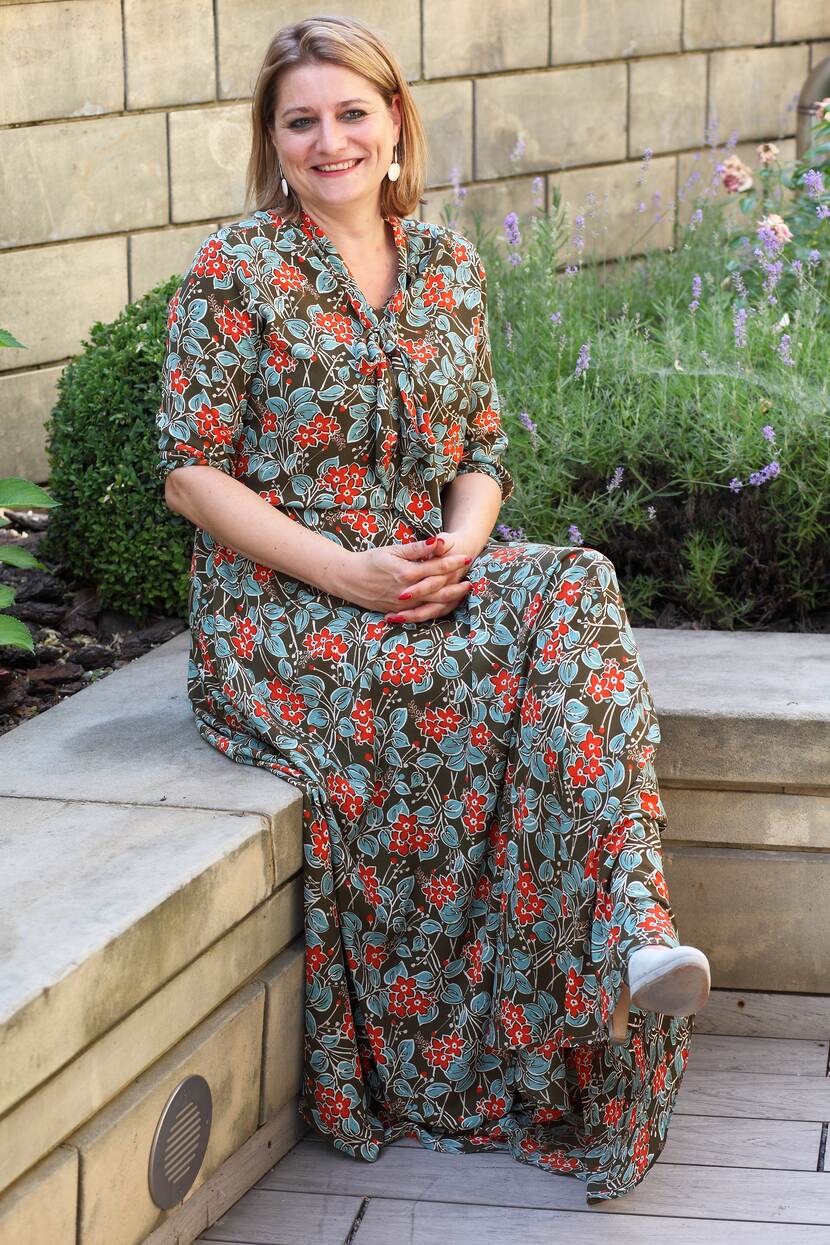
What is your impresson about Kyiv?
Kyiv is developing very fast: former industrial areas like @artzavodplatforma and previously neglected architectural sites like River Port are turned into trendy creative places. The list of festivals with participation of well-known Ukrainian and international performers is quite impressive. The markets and showrooms of Ukrainian brands and producers (@vsi.svoi and @madeinukraine.fest) attract many visitors. Interesting events happen almost every week. Khreshchatyk turns into a pedestrian zone on the weekends and there is always something interesting happening there. New art galleries or bars, etc. are regularly opened in Kyiv. I always try to take a peak in the many courtyards, that is actually where the hidden new places are. From April till autumn many attractions take place outdoors.
And a special mention for the coffee, we Dutch drink a lot of coffee. I was worried before moving here that finding delicious coffee would be a problem for me. My friends and family often ask me before they arrive if they should bring coffee with them. Now, of course, I make fun of these fears, because on every corner or square in Kyiv you can find baristas who can make you a great coffee to go. My favorite place is the Tram Cafe in Shevchenko Park. There you can enjoy your coffee watching the chess games. Now every time I travel to the Netherlands, I find myself looking around the streets searching for coffee wagon and get very upset when I don't find one. It is something I will definitely miss when I leave.
It is never boring in Kyiv, everything is open until late in the evening. This is very convenient for busy people who work late and have to shop in the evening or on weekends. And even if I prefer to stay at home during weekend, I can easily order just about anything I need online, delivery services work very well. I experienced ordering food from supermarkets and nearby restaurants. Moreover I ordered Boerenkool (Kale) from the farm in Dnipropetrovsk region, flowers from Chernivtsi region and dresses from Lviv. Many services in Ukraine have Facebook pages, phone applications or an online appointment system. This is extremely convenient for foreigners who do not speak Ukrainian or Russian. I’m mentioning this especially because I also know how difficult it can be to find your way in the city life when you have just arrived and do not know the language. Of course, there are still things in Kyiv that could go smoother and need improvement, but for me, this is the charm of a city that is still developing.
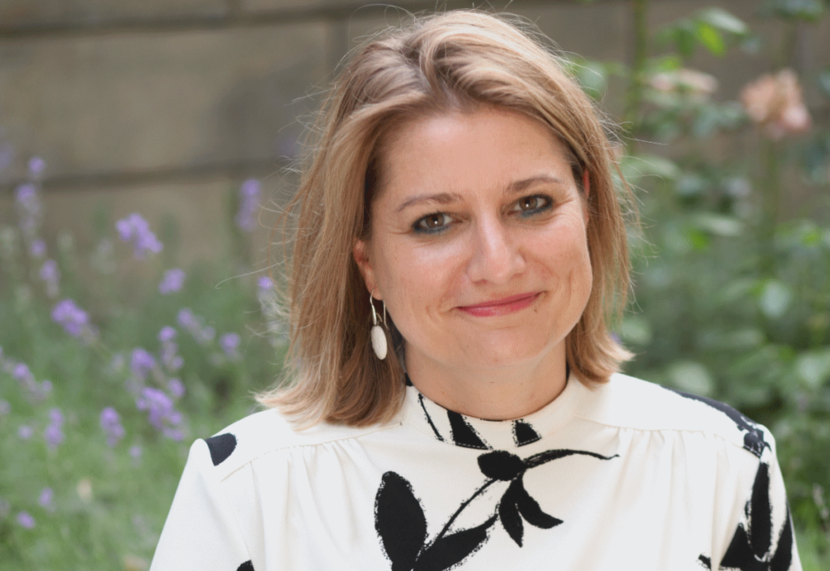
How do you see the potential of Ukrainian cities for doing business?
Kyiv and many other Ukrainian cities are still developing, they are not overregulated as Western European cities. There is room for creativity and new initiatives and this provides favorable business environment. I found many bright and creative Ukrainian brands that have become my favorite. My friends always go back to the Netherlands with things from Ukrainian designers.
Ukrainian business is very flexible, you can be in direct contact with the producer while making your choice and placing your order. In Ukraine I switched from the mass-produced goods to the local brands. For the same price as in the Netherlands, here I can buy absolutely unique things, designed individually to my taste. This is exactly how my potato dress was made.
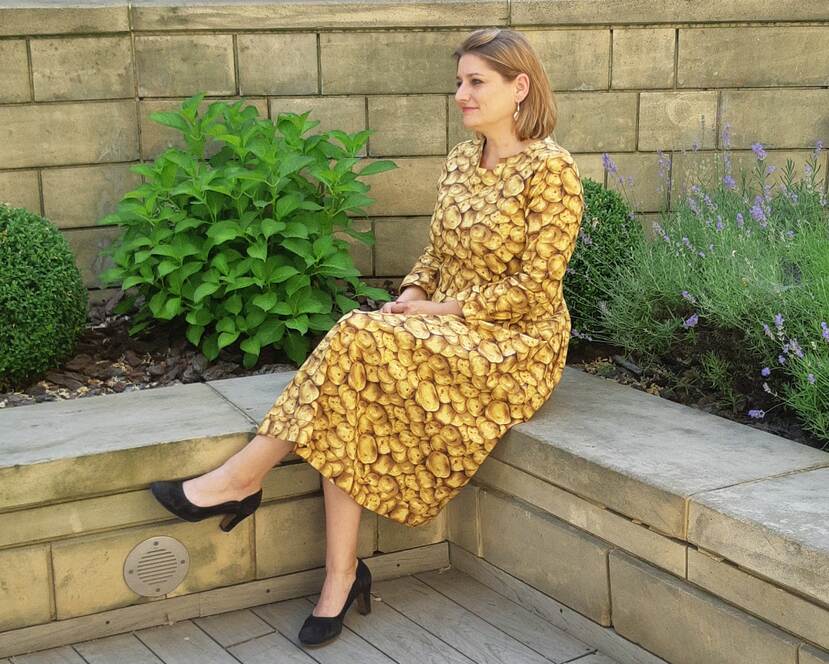
What is the story of your potato dress?
Potato is eaten almost every day in a regular household in the Netherlands as one of the three main components of the dinner besides meat and vegetables. It is no wonder, then, that potatoes are depicted in Van Gogh's famous painting “Aardappeleters” (“The Potato Eaters”). The potato sector is very important for Dutch – Ukrainian cooperation. Ukraine imports a lot of seed potatoes from the Netherlands. Dutch production and processing technologies are widely used in Ukrainian potato sector. We work closely on the development of the sector with the Ukrainian association of potato producers (http://www.potatoclub.com.ua/) and have our annual Dutch Ukrainian potato forum which took place for the tenth time last February. However when we found a fabric with potato print, I could not even think that it would turn out to be a beautiful dress that would become known among Ukrainian and Dutch professional potato growers. This is how my professional activity intertwined with Ukrainian design. In addition to a potato dress, Makar, Maki Maki (@MAKIfds) designed for me a lettuce blouse which I used for a cooking show, a tomato skirt and a number of beautiful dresses. He is a young creative guy fond of art, not only fashion, and works with both individual customers as well as companies. I met Makar at one of the events with the participation of Ukrainian producers, organized by the German-Ukrainian agro-political dialogue (https://apd-ukraine.de/ua/).
As Agricultural Counsellor I often attend formal ceremonies, business and networking events. Also, we often travel with my team. It often happens in Ukraine, some events pop up in our agenda unplanned. When after a motorbike fest with a delegation from a trade mission you are invited to the solemn reception, you definitely miss a Cinderella’s godmother to help you with an outfit. Thanks to one of these unexpected invitations, I bought a wonderful Andre Tan (@AndreTan.Official) evening dress in Vinnytsia. Since then, it has become my custom: every time I plan a trip to Vinnytsia, I allow myself a new dress made in Ukraine. I often receive compliments from our network about my dresses and I am always proud to say that they are made in Ukraine.
My collection of Ukrainian dresses and accessories is growing, and I am happy that wherever my job will bring me, there will always be a part of Ukraine with me. Moreover, I believe that by buying, wearing and using locally produced products, I can promote Ukraine here and abroad.
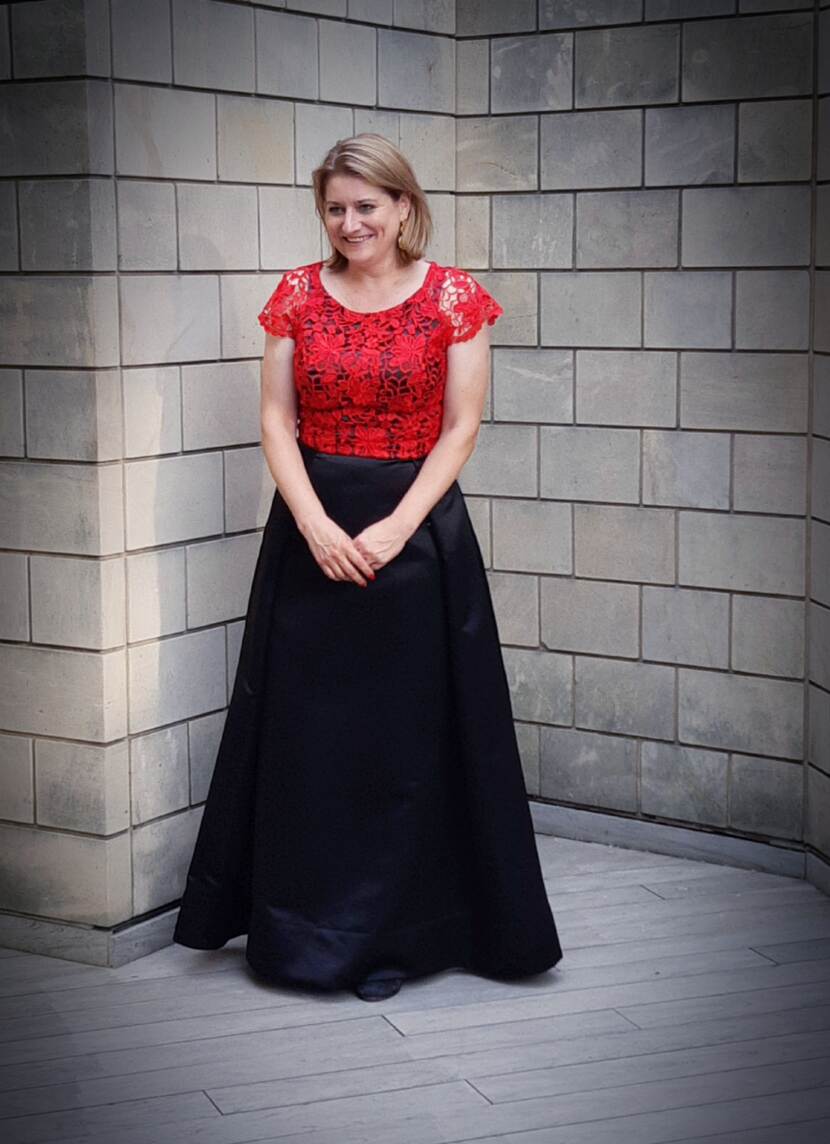
Tell about your activities in the regions of Ukraine
As I mentioned we travel a lot around Ukraine. Agriculture is in the regions, not in the capital. It is not always easy to drive on the Ukrainian roads, but I realized that when the roads become worse, the views get even better. Ukraine is a very large country and it is very diverse not only in nature but also in culture and traditions. I love meeting people in different cities and villages. They are always very open, share their experiences and are full of ideas. It is they who develop agriculture, they create jobs in regions and develop rural areas. With the available tools from the Dutch government we participate in a number of initiatives in the regions: organize trade missions with the participation of Dutch companies, do market studies of business opportunities, support projects which develop touristic potential of the Ukrainian rural areas. I am convinced that it is very important to make rural areas attractive to the young people. Technologies can significantly alleviate the hard labor in the village. There are many high-tech solutions currently used in agriculture and, as a consequence, many job vacancies are available for young well educated people. I am pleased to notice that the cases when creative urban youth come to the villages to realize their unique business ideas are very common. Improvement living standards in the rural areas is a key to efficient agriculture and further development of the Ukrainian economy.
We at the Embassy always welcome Dutch businesses who are building new production facilities in Ukraine, creating jobs, expanding cooperation with local partners and contributing to the activities of local communities.
Often, I visit different high-quality productions in the regions, and when I am back to Kyiv, I buy their products with great pleasure and promote them among our colleagues and friends. I think it is a privilege of my job to meet with farmers and producers and see how the products we consume are grown and produced. Take for example the dairy products from Ternopil, Kherson watermelons, Brynza cheese from the Carpathians, greens and lettuce from Busk, strawberries from Volyn, apples from Vinnytsia, potato and potato products from Zhytomyr and Chernihiv, flowers and greenhouse vegetables from Kyiv region and many others. Of course, as a representative of the Ministry of Agriculture of the Netherlands, I am extremely pleased to see that the vast majority of these products are produced in Ukraine using Dutch materials and technologies, and sometimes even by Dutch farmers who live and work here.
How can the Ukrainian business cooperate with the the Dutch?
More than 300 Dutch companies are represented in Ukraine. There are even more Ukrainian companies cooperating with the Netherlands. Although my mission, as an employee of the Dutch Government, is to support Dutch businesses in Ukraine, we are also assisting Ukrainian companies searching Dutch technology or services. In addition, we cooperate on the governmental level in order to overcome trade barriers between our countries and to assist Ukraine in its process of harmonization of legislation as agreed in the Association Agreement.
For the Ukrainians who look for cooperation with the Netherlands I have some practical tips:
- Knowledge of English is very important. The Dutch do not speak Ukrainian. I have Ukrainian classes and try to speak Ukrainian a bit so at least I can survive in my daily life. There are also several Dutch farmers in Ukraine who are fluent in Ukrainian. However, usually Dutch do not speak either Ukrainian or Russian, but they all speak English, and most of them German as well.
- Dutch business is built on trust and keeping the word. Stamps and signatures are not important, business reputation and reliability is what matters.
- Planning and agreements. It is normal for the Dutch to schedule a meeting half a year in advance and come exactly on time. We value our time and respect time of our partners.
- Directness. Straight to the point it can come across as rude. At meetings Dutch prefer to get right down to business, don’t take it personal.
- Coffee first. Yes, we drink a lot of coffee. In the morning and during a day. Do not forget to offer a cup of coffee to your Dutch partner. I do have to say though that the Ukrainian hospitality goes much further than the Dutch. In the Netherlands it is the custom to only offer one cookie with that coffee, which can come across, again, as a bit rude.
- Comparing the representatives of our two countries, there are many common features besides the many differences. Both Dutch and Ukrainian women seek self-fulfillment and financial independence, they succeed in projects that require hard work and ability to build up good relationships with their clients. In addition, both Dutch and Ukrainians are trying to avoid risks. Learn more at https://www.hofstede-insights.com/.
- If you want to stay in touch, please follow us on https://www.agroberichtenbuitenland.nl/landeninformatie/oekraine or look up the European Enterprise Network when looking for trade partners in the Netherlands.
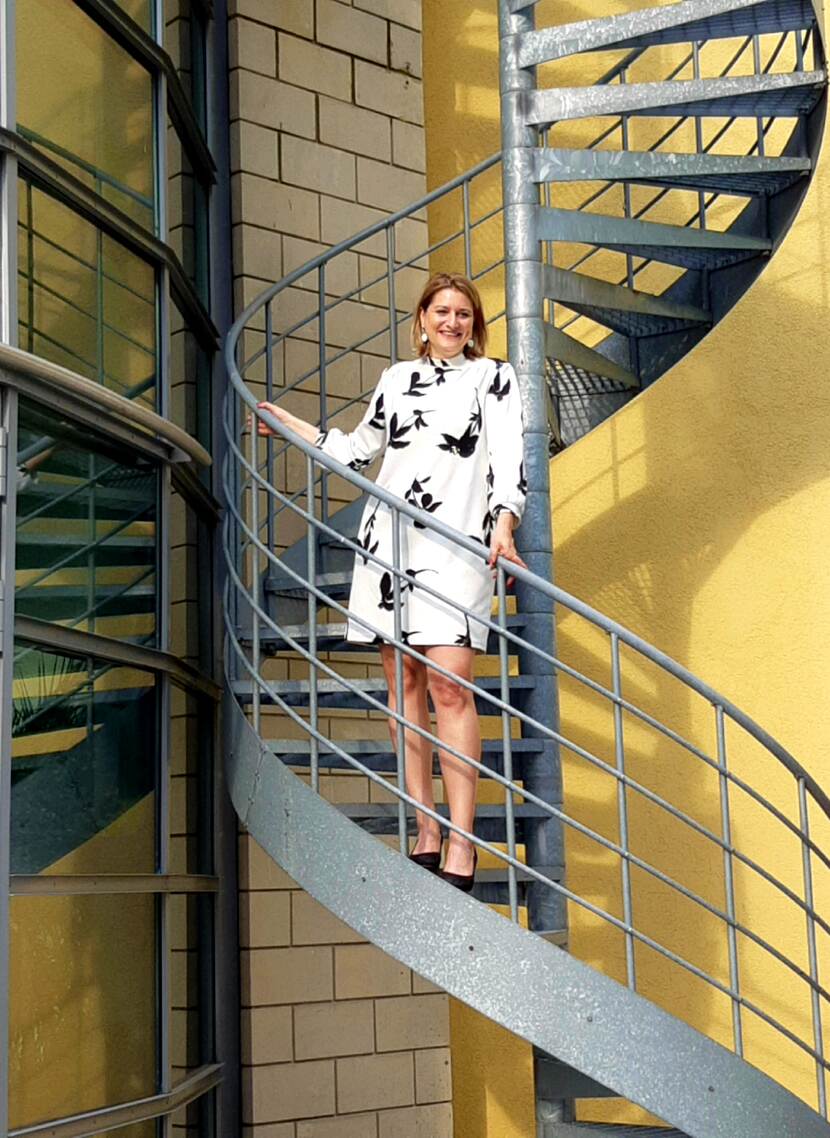
How will sustainability and responsible approach change business and economy in future?
The Netherlands is the second exporter of agricultural products and that also brings responsibility. The minister of Agriculture in the Netherlands brought her vision of a sustainable agricultural sector in 2030 which closes the cycle on the lowest level as possible and uses the least of inputs as possible while at the same time the consumer needs to value food more and provide for a fair price for the farmers. The experience of the Netherlands in sustainability, which we already have and will further develop, can be used in other countries as well. Whether it is with vegetable seeds that need less water of produce products with a longer shelf life or more eco-friendly packaging and everything in between. Responsible production and consumption are becoming very important in different sectors of economy. Why is there a focus on agriculture? Because the Netherlands is the largest importer of agricultural products from Ukraine among the European Union Member States. It is also important to mention that the minister is envisaging that raw materials should be produced as much as possible locally or regionally. Responsible production of those raw materials is an important element in the vision of the development of Dutch agriculture, and therefore becomes important for Ukrainian business who look to enter the EU market.
Responsible production was also a part of a special training course for innovative entrepreneurship and sustainable development under the She Exports program, held in February-June 2019 with the participation of Noorderwind trainers from the Netherlands, in partnership with the Embassy of the Netherlands in Ukraine, with financial support from the Netherlands Enterprise Agency (RVO) and Ministry of Foreign Affairs of the Netherlands.
Interview in Ukrainian language
The interview in Ukrainian published by Womo project can be found here
On https://womo.ua/ the interviews with participants of this training course can also be found.
Materials for this interview were provided by the Embassy of the Kingdom of the Netherlands in Ukraine in cooperation with Alina Sevastyuk.
Special thanks to Alina Sevastyuk for the great photos.